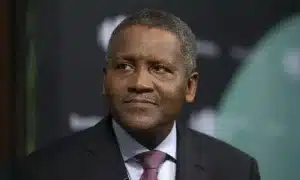
Africa’s richest man and Chairman of the Dangote Group, Aliko Dangote, announced that Nigeria would cease to import gasoline within the next month thanks to the operations of the Dangote Refinery. In a groundbreaking statement at the Africa CEO Forum Annual Summit in Kigali on Friday, Dangote expressed his confidence in the refinery’s capacity to […]
The post Dangote Reveals When Nigeria Will Totally Stop Fuel Importation appeared first on Naija News.
